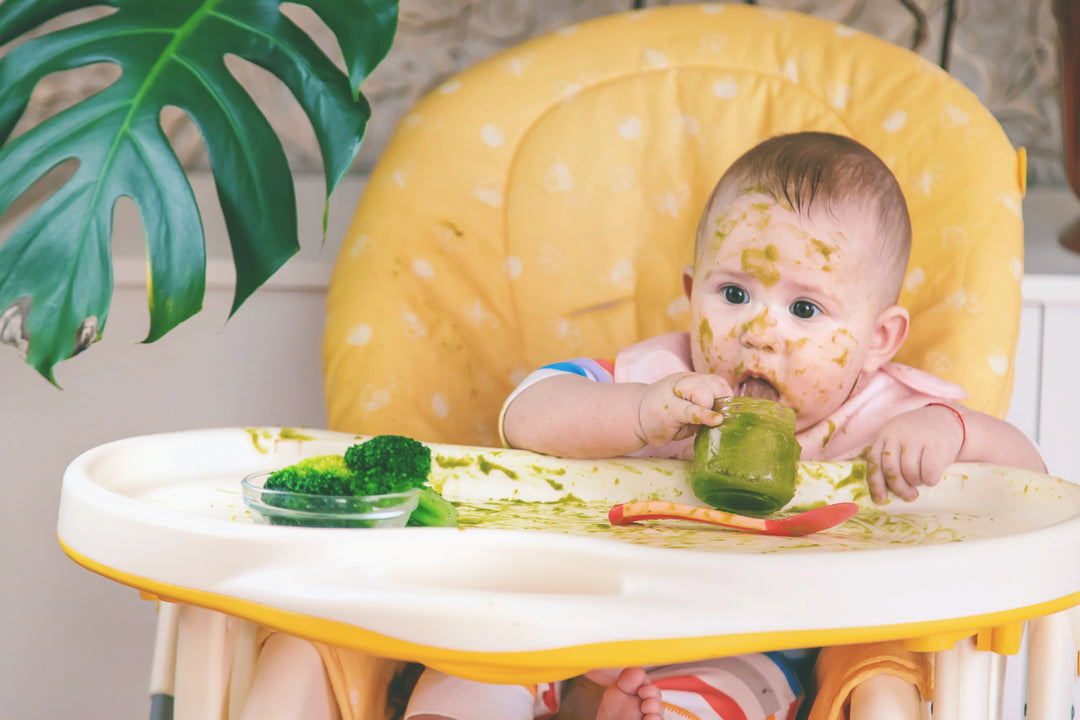Spotting Food Allergies in Babies: Symptoms and Signs Explained by a Pediatric Allergist

As a pediatric food allergist, several times a week, I meet a family with an infant who has developed a new food allergy. This correlates with the high numbers of children with food allergy in the United States - about 1 in 13 children have at least one food allergy. Some of these children develop allergy symptoms the first time they ever try the food, while others may not develop allergy symptoms until much later. And sometimes we are unsure if it truly is an allergy, or something else (read more on different conditions that sometimes look like an allergy). Although this truth can make feeding your infant nerve-racking, it is imperative to know when to be concerned about an allergic reaction.
Since I offer oral food challenges and oral immunotherapy treatment in my practice, I have extensive experience identifying and treating infants with anaphylaxis (severe allergic reactions). As I explain to parents, although infants are non-verbal, they can give us many signs and clues that something isn’t right. These signs apply to older children as well, who are non-verbal or minimally verbal.
I’ll share with you how I know an allergic reaction is occurring so you can feel comfortable identifying when you need to act, especially when starting solids and introducing allergens for the first time. Knowing what to look for can help you act quickly and keep your child safe.
Signs of food allergies in babies

Acute change in behavior
The hallmark of an allergic reaction is rapid onset of symptoms; your infant is happily feeding one moment and the next minute things have changed - maybe a rash, they are irritable, coughing, or scratching all over.
Skin symptoms of food allergies in infants
Skin reactions are often the first visible clue of a food allergy in infants. Watch for:
-
Hives (raised, red, itchy bumps on the skin that look like mosquito bites)
-
Swelling around the eyes, lips, or face
-
Scratching
-
Pulling at tongue
-
Red flat blotchy rash around the mouth, redness of ears or other areas of the body
-
Eczema flare - areas where eczema is present become bright red
Even if the skin symptoms seem mild, or even go away on their own, they should always be discussed with your pediatrician or allergist. These can be the early stages of a more significant reaction and often indicate a food allergy.
Gastrointestinal symptoms of food allergies
Food allergies often affect the gastrointestinal system. Symptoms may include:
-
Vomiting, gagging
-
Diarrhea
-
Irritability
-
Refusal to continue eating
Breathing problems from food allergies in babies
Though far less common in infants, respiratory symptoms can signal a more serious reaction. These can be from airway swelling or from constriction of the lower airways. Look for:
-
Wheezing (high pitched whistle-like) or noisy breathing
-
Persistent cough after eating
-
New nasal congestion
-
Difficulty breathing
-
Hoarse or weak cry
Circulatory problems and emergency signs
Severe allergic reactions can drop a child’s blood pressure dangerously low. Emergency signs of this include:
-
Infant not responding to you
-
Loss of consciousness (passing out)
-
Appearing pale
What to do if you think your child has a food allergy

Treating mild symptoms at home
If your child has a mild rash after eating, but is otherwise acting normally, call your pediatrician or give an age-appropriate dose of liquid cetirizine (Zyrtec ®). This is now preferred over liquid diphenhydramine (Benadryl ®), but if that is all you have you can use that.
When to call 911 for an allergic reaction
If your child has any other severe symptoms, including coughing, breathing difficulties, changes in their behavior, vomiting, or you are worried about them, call 911. Tell them you think your child is having an allergic reaction. They will be able to treat your child quickly with epinephrine, which can be life-saving in severe allergic reactions.
When to see a pediatric allergist

Allergy testing and diagnosis
If your child has had any of these symptoms after eating a certain food, especially if it has happened more than once, tell your pediatrician and get a referral to a board-certified pediatric allergist.
How pediatric allergists help
-
Identify food allergens from clinical history, supplemented by testing
-
Provide guidance on safe feeding strategies
-
Prescribe emergency medication if required
-
Monitor whether your child may outgrow the allergy
-
Discuss possible treatment options - omalizumab injections, oral immunotherapy, clinical trials
Takeaway for parents
Trusting your instincts
My best advice for parents: Trust your instincts.
If something feels wrong after your baby eats, stop feeding them that food and monitor them closely. Treat them with allergy medications or call your pediatrician if necessary, following up with an evaluation for food allergy. Early recognition and proper management of food allergies are the keys to keeping your child safe and healthy! You’ve got this!
Helpful resources on food allergies
If you want more information of food allergy symptoms, the Asthma and Allergy Foundation of America, can be a helpful resource. I provide my patients with this same reference and find it very useful.


Written by Dr. Taylor Lin
Pediatric Allergist & Advisor at Bébé Foodie
Meet Dr. Taylor Lin, our go-to expert on allergies and immunology! Dr. Lin serves families in southeast Michigan as an allergy and immunology physician with Allergy & Immunology Associates. With top-notch training from the University of Michigan and a specialty fellowship in pediatric food allergy, she’s not just highly qualified—she’s also a mom to a child with food allergies herself! Dr. Lin directs her clinic's food oral immunotherapy program and brings evidence-based, accessible advice to families through her role with Bébé Foodie.



Leave a comment